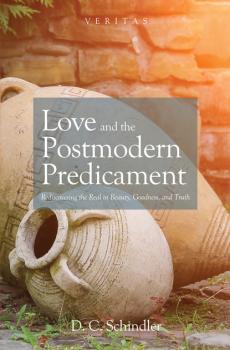ТОП просматриваемых книг сайта:
David C. Schindler
Список книг автора David C. SchindlerАннотация
The computer has increasingly become the principal model for the mind, which means our most basic experience of «reality» is as mediated through a screen, or stored in a cloud. As a result, we are losing a sense of the concrete and imposing presence of the real, and the fundamental claim it makes on us, a claim that Iris Murdoch once described as the essence of love. In response to this postmodern predicament, the present book aims to draw on the classical philosophical tradition in order to articulate a robust philosophical anthropology, and a new appreciation of the importance of the «transcendental properties» of being: beauty, goodness, and truth. The book begins with a reflection on the importance of metaphysics in our contemporary setting, and then presents the human person's relation to the world under the signs of the transcendentals: beauty is the gracious invitation into reality, goodness is the self-gift of freedom in response to this invitation, and truth is the consummation of our relation to the real in knowledge. The book culminates in an argument for why love is ultimately a matter of being, and why metaphysical reason in indispensable in faith.
Аннотация
The Perfection of Freedom seeks to respond to the impoverished conventional notion of freedom through a recovery of an understanding rich with possibilities yet all but forgotten in contemporary thought. This understanding, developed in different but complementary ways in the German thinkers Schiller, Schelling, and Hegel, connects freedom, not exclusively with power and possibility, but rather most fundamentally with completion, wholeness, and actuality. What is unique here is specifically the interpretation of freedom in terms of form, whether it be aesthetic form (Schiller), organic form (Schelling), or social form (Hegel). Although this book presents serious criticisms of the three philosophers, it shows that they open up new avenues for reflection on the notion of freedom; avenues that promise to overcome many of the dichotomies that continue to haunt contemporary thought–for example, between freedom and order, freedom and nature, and self and other. The Perfection of Freedom offers not only a significantly new interpretation of Schiller, Schelling, and Hegel, it also proposes a modernity more organically rooted in the ancient and classical Christian worlds.


